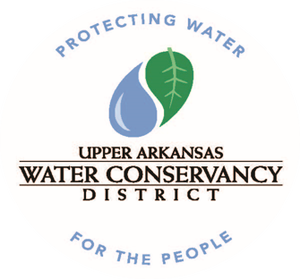|
This is part one of a two-part series by General Manager, Ralph "Terry" Scanga
Most discussions involving water supply or quality require a good examination of historical perspective of water development. For this reason, understanding the system by which water is and has been allocated in Colorado since statehood is a good starting point. Water in Colorado is allocated as a private property right through a system referred to as the Appropriation Doctrine. It is the only arid Western state that utilizes a pure form of this doctrine called the “Colorado Doctrine”. This doctrine is enshrined in the State’s constitution. It is a constitutional right for the citizens of Colorado to an appropriation of water based on its beneficial use. Although many legislative statutes deal with water appropriation and use these all rely upon and must comport with the basic constitutional right granted the citizens of the state. This article is not intended to delve into the Doctrine except to point out that water rights and decrees are granted as a private property right. In fact, this system is automatically designed to apportion available water supply without undue interference from government except for the administration of the existing water decrees or through the water court. In 2005 legislation was passed creating the inter-basin compact committee and the nine basin roundtables. The basins utilized the Statewide Water Supply Initiative (A project to calculate the available water supply compared to demand --a needs assessment) to identify the projects and processes needed to address any water supply gap out to the year 2050 for all uses- municipal, industrial, irrigation (agricultural), environmental and recreational. Water entities and individuals were involved in each basin throughout the state to develop these plans. Projects were identified and some were funded in part with grants from the state’s Colorado Water Conservation Board. The Colorado Water Plan was developed from these plans and processes. These projects have gone a long way to make available the necessary water supplies for the future. Many of the projects are ongoing and more will be needed to meet future needs. Colorado is an arid state with future shortages forecast in the higher growth regions. In the Arkansas Basin many junior water rights were established during high precipitation periods. Due to this the Arkansas Basin today is considered an over-appropriated basin; meaning that on average there are more decreed water rights than water available. Most of these junior water rights are decreed for irrigation use in agriculture. In the Arkansas Basin shortages are forecast for all water uses. The Colorado Water Plan is a collection of the ideas and projects on how we can meet future water demands. Meeting the future need revolves around developing new Colorado River Supplies and Alternative Agricultural Transfers coupled with storage. The Colorado River normally has water that is unused and could be utilized to fill the gaps in the higher growth regions. Presently Colorado is well ahead in meeting its Compact obligations on the Colorado River despite unsubstantiated claims from some state politicians and the administration that Colorado may be unable to meet its obligations. Agricultural irrigation uses 80 percent or more of the available supply statewide. Some of these uses could be temporarily interrupted through court approved Lease-Fallowing agreements, and the water owner compensated, to meet shortages in drier years. In wet years existing storage and new storage could be utilized to save the excess for drier times. Storage projects including alluvial storage need to be built to meet the future needs. Through the existing Appropriation System, the above plans and others are underway to meet this future need. Water storage operations could be adapted to meet multiple uses for stream management to meet increased demands for the environment and recreation. All this can and should be completed through the Colorado Doctrine of Appropriation, a strong legal framework to guarantee the security, reliability and flexibility in the development and protection of water resources. In our next “Water Talks” article we will explore the various threats to our water supply.
0 Comments
By Ken Baker - Board Consultant
The Colorado General Assembly is in session and the Upper Arkansas Water Conservancy District is closely monitoring water-related legislation. In our March legislative update I have highlighted some of the issues we are closely following. Change in Republican River District Boundaries HB19-1029 will require a larger number of water users to pay for well pumping in the newly enlarged district. Water Loans for Stream Use HB19-1218 will amend the existing statute that grants authority to the Colorado Water Conservation Board for loaning water for in-stream purposes. Provisions state that the loaned water is to be used for preserving the natural environment of a stream reach that is subject to a decreed in-stream flow right and preserving or improving the natural environment to a reasonable degree for a stream reach for which the Colorado Water Conservation Board does not hold a decreed in-stream right. The bill would increase the number of years of the loan from three years to five years of a ten-year period. Study of Blockchain Technology in Water Uses This bill, SB19-184, is in response to the rapidly emerging technology of blockchain. Governor Polis has announced a major long-term commitment by his administration to make Colorado a hub for the technology of blockchain. Blockchain technology most often associates with crypto-currency, but it has a vast array of uses with respect to asset management, inventory control, product safety, and other applications where security of interchanges is a high priority. SB19-184 authorizes the Colorado Water Institute to study potential uses of blockchain technology in various water applications such as recording and monitoring water rights, developing market exchanges of water, the creation and operation of water banks, aquifer storage retrieval and other applications. When the Institute has completed the study, it will report back to the General Assembly. Restructuring of State Regulations of Oil and Gas Exploration and Extraction HB19-181 proposes major restructuring of the regulatory treatment of the oil and natural gas exploration and extraction industry. Concerning the Expansion of Agricultural Chemical Management Plans to Protect Surface Water SB19-186 is a plan that CSU has worked on with the Department of Agriculture. The word groundwater has been replaced with the term “state waters”.
|
ABOUTLocal water news by the Upper Arkansas Water Conservancy District Archives
August 2023
Categories |
CONNECT |
|
UAWCD Technology Accessibility Statement
UAWCD is committed to providing equitable access to our services to all Coloradans.
Our ongoing accessibility effort works towards being in line with the Web Content Accessibility Guidelines (WCAG) version 2.1, level AA criteria. These guidelines not only help make technology accessible to users with sensory, cognitive and mobility disabilities, but ultimately to all users, regardless of ability.
Our efforts are just part of a meaningful change in making all State of Colorado and local government services inclusive and accessible. We welcome comments on how to improve our technology’s accessibility for users with disabilities and for requests for accommodations to any UAWCD services.
Requests for accommodations and feedback
We welcome your requests for accommodations and feedback about the accessibility of UAWCD’s online services. Please let us know if you encounter accessibility barriers. UAWCD is committed to responding as quickly as possible.
E-mail: [email protected]
Mail: P.O. Box 1090, Salida, CO 81201
Phone: 719-539-5425 (Written requests are preferred. If you are unable to submit your request in writing, you are welcome to contact us by telephone at this number.)
UAWCD is committed to providing equitable access to our services to all Coloradans.
Our ongoing accessibility effort works towards being in line with the Web Content Accessibility Guidelines (WCAG) version 2.1, level AA criteria. These guidelines not only help make technology accessible to users with sensory, cognitive and mobility disabilities, but ultimately to all users, regardless of ability.
Our efforts are just part of a meaningful change in making all State of Colorado and local government services inclusive and accessible. We welcome comments on how to improve our technology’s accessibility for users with disabilities and for requests for accommodations to any UAWCD services.
Requests for accommodations and feedback
We welcome your requests for accommodations and feedback about the accessibility of UAWCD’s online services. Please let us know if you encounter accessibility barriers. UAWCD is committed to responding as quickly as possible.
E-mail: [email protected]
Mail: P.O. Box 1090, Salida, CO 81201
Phone: 719-539-5425 (Written requests are preferred. If you are unable to submit your request in writing, you are welcome to contact us by telephone at this number.)



 RSS Feed
RSS Feed